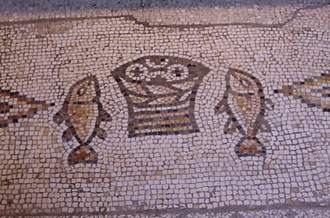 Loaves and Fishes mosaic in the Church of the Multiplication in Tabgha, Israel
Loaves and Fishes mosaic in the Church of the Multiplication in Tabgha, Israel
Scripture: Lectionary 178. Isaiah 25:6-10. Psalm 23:1-3. 3-4.5.6. Matthew 15:29-37:
Consolation and compassion are God’s words to us today from the prophet Isaiah and the Gospel of Matthew. There is a universal theme to these gifts from God for the readings bring in the Gentiles as well as God’s chosen people. Perhaps, Matthew’s second account of the miraculous feeding is specifically addressing the Gentiles while the first is addressed to the Israelites or Jesus’ own people. There are two accounts of the Feeding in Mark; Matthew faithfully follows Mark throughout his Gospel. Actually, this miracle has a total of six accounts and is found once in Luke and in John. It has Eucharistic language within it and is the thanksgiving that Jesus offers to God and then shares with us through the miracle of love and compassion with enough food for all.
Isaiah is also using messianic language in the image of a banquet on Mount Zion. He gives a universalism to his prophetic message that is not found in other prophets. All are included. There is mention of God saving the people through the promises made through Isaiah and we rejoice that we are included in that prophetic promise being fulfilled through Jesus and the feeding of the huge crowd of men, women, and children.
The cures mentioned before the miraculous feeding are also miraculous through the power of the Spirit seen in Jesus’ words of mercy and compassion. The hungry are satisfied, the blind see, the cripples walk, and all who have faith are healed. The Lord has compassion on all for he is like a shepherd. The Psalm is that of the Good Shepherd and Jesus is the model for the Good Shepherd in this liturgy.
Without God, without the Spirit, without Jesus, we are lack sheep wandering here and there. The shepherd gathers and guards us in verdant pastures.
Both consolation and comfort are realized in our three readings from Isaiah, Psalm 23, and the selection from Matthew. We easily recognize the Eucharist in the fact that Jesus takes the loaves, gives thanks, and breaks them in order to have the disciples distribute them to the people. The bread of life comes alive both in a physical sense in this narrative and also in a sacramental sense.
Jesus is our Advent, the one who comes to us, especially in Word and Sacrament. Amen.
Copyright 2012 Fr. Bertrand Buby, S.M.
About the Author

Guest
We welcome guest contributors who graciously volunteer their writing for our readers. Please support our guest writers by visiting their sites, purchasing their work, and leaving comments to thank them for sharing their gifts here on CatholicMom.com. To inquire about serving as a guest contributor, contact editor@CatholicMom.com.


.png?width=1806&height=731&name=CatholicMom_hcfm_logo1_pos_871c_2728c%20(002).png)
Comments